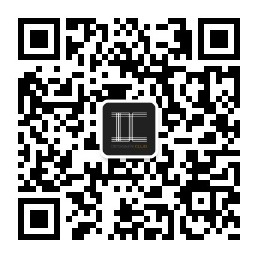
What are the exemptions for domestic rail transport of lithium batteries?
Time:
2024-06-25 09:04
In recent years, as the market demand for personal consumer electronics, new energy vehicles, and large energy storage batteries continues to rise, lithium batteries and related equipment/The production and trade of vehicles is also very active. In the domestic railway transportation link, lithium batteries and related products are dangerous goods, which shall be in accordance with the "List of Dangerous Goods by Railway" (TB/T 30006-2022, hereinafter referred to as the list of names), including accurate classification, reasonable packaging, labeling, etc. However, in order to promote the transportation of consumer lithium battery products and new energy vehicles,2023The National Railway Administration, in conjunction with the Ministry of Industry and Information Technology and the National Railway Group, allowed lithium batteries and their products that meet specific requirements to be transported as ordinary goods in domestic railway transportation in the form of guidance. In this issue, the editor will briefly sort out the core requirements of the relevant guidance and which lithium battery products are applicable.
- Consumer Lithium Battery Products
On November 2, 2023, the State Railway Administration, the Ministry of Industry and Information Technology, and China National Railway Group Co., Ltd. jointly issued the National Railway Transport Supervision [2023] No. 26 "Guiding Opinions on the Railway Transport of Consumer Lithium Battery Cargo" (hereinafter referred to as the Guiding Opinions). For consumer lithium battery goods that meet the special regulations of 78 and 79 of the product name list, domestic railway transportation may not be used as dangerous goods.

Figure1 National Railway Transportation Supervision [2023] No. 26 "on the guidance of the consumption of lithium battery cargo railway transport work"
(I) applicable objects
The above exemption only applies to small lithium batteries and related products, such as mobile phones, portable computers, digital cameras, electric toys, mobile power supplies. 
Figure2 Examples of common consumer lithium battery products (Image source: National Railway Administration)
Such goods in the name list in the iron danger number mainly includes.91042(UN 3090), 91043(UN 3091), 91045(UN 3480) and 91046(UN 3481).
Friendly reminder: according to the special provisions of the name table72 The range of consumer lithium batteries (e. g., defective safety, damaged, recycled or disposed of lithium batteries) is prohibited from rail transportation.
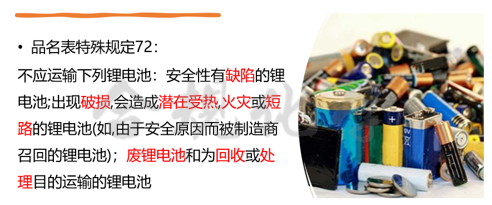
Figure3 Special Provisions 72 Contents
Technical requirements for (II) general cargo transportation
1. Meet the requirements of special regulations 78 and 79
Special provisions78 and 79 are basically consistent with the requirements of Special Provisions 188 and Subsection 2.9.4 of the United Nations TDG regulations, and their core points are as follows:
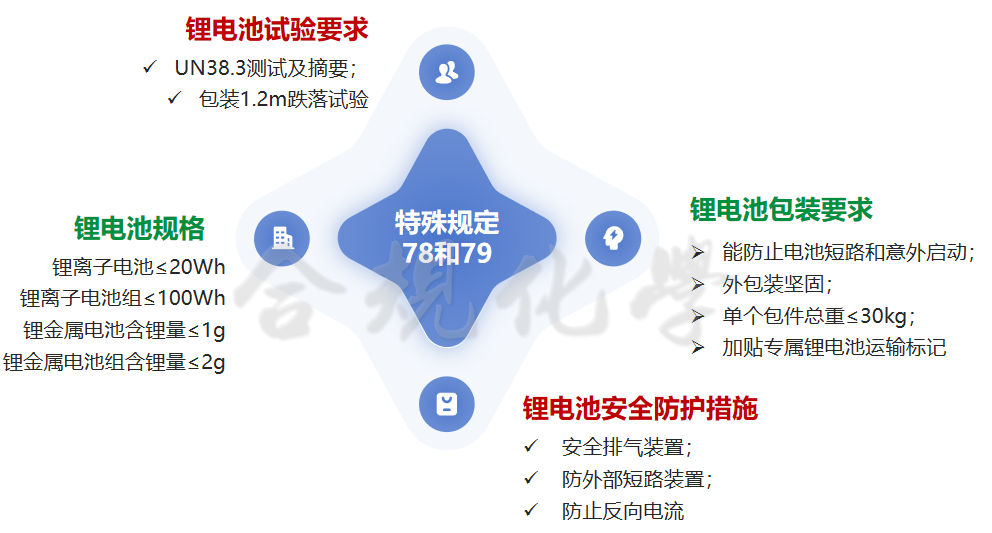
Figure4 Main contents of special provisions 78 and 79
2. Meet the requirements of guidance
(1) Requirements of appraisal institutions
The enterprise is required to provide an Appraisal Report on Railway Transport Conditions, and the appraisal body is required to obtainCMA and CNAS double C certification.
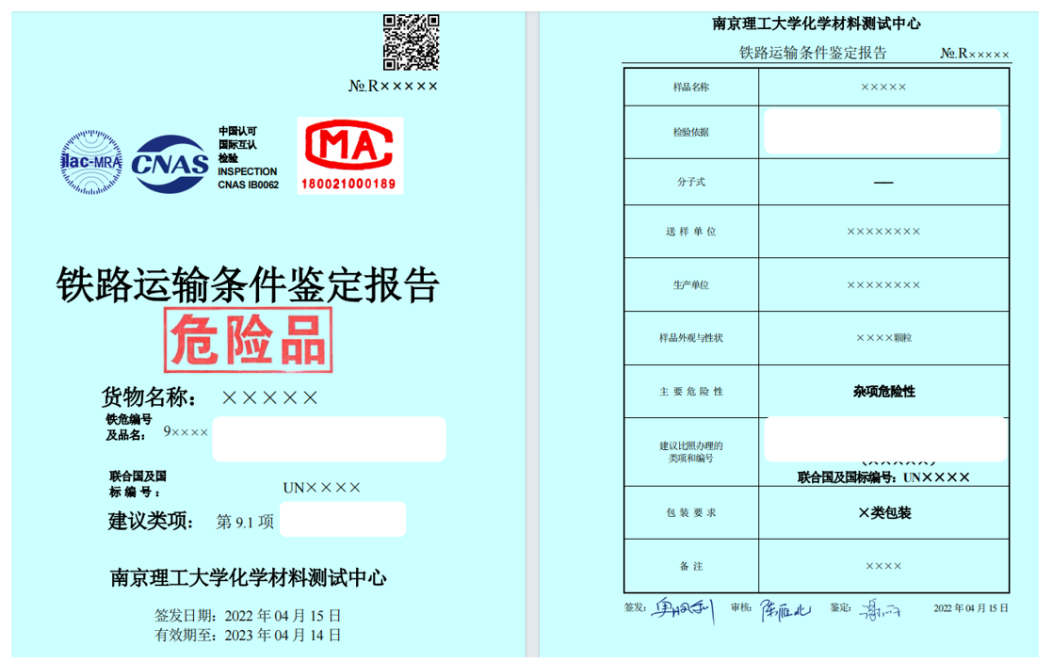
Figure5 Sample report for identification of railway transport conditions
The report is required to determine whether the lithium battery cargo to be shipped meets the special requirements.78, 79 requires judgment, and at the same time, it is necessary to judge whether the lithium-ion battery manufacturer meets the requirements of the Ministry of Industry and Information Technology's "Lithium-ion Battery Industry Standard Conditions" and "Lithium-ion Battery Industry Standard Announcement Management Measures.
(2) Lithium battery packaging testing requirements
The packaging of lithium batteries shall comply with the Packaging for the Transport of Dangerous Goods by Railway (TB/T 2687-2020) stipulates that not only the drop test but also the stacking test shall be passed. The railway transport packaging shall be inspected and qualified by an inspection institution with corresponding qualifications.
(3) Consignment management requirements
The shipper shall indicate on the shipping document"The name of the product (iron danger number) conforms to the special provisions 78 and 79 and is not transported as dangerous goods". When consigning lithium-ion batteries and battery packs (iron risk number 91045), the shipper shall ensure that the state of charge (SOC) of the battery is less than or equal to 30%.
The guidance requires the shipper to submit the product safety test report, railway transportation condition appraisal report, railway transportation packaging inspection report, safety commitment and emergency response measures to the carrier, and be responsible for the authenticity of the materials and the safety of the goods.
Friendly reminder: Compared with sea transportation and land transportation, the guidance has increased stacking tests andSoC requirements. In the air transport DGR, the 64th revision of DGR also revised the packaging instructions PI 965 IB and PI 968 IB, adding 3m stacking test requirements. At the same time, there are also requirements for the state of charge in the air transport DGR. When the lithium ion battery or battery pack exceeds 30% of the rated capacity, it can only be transported on cargo planes with the approval of the competent authority, otherwise it cannot be transported.
2. new energy vehicles
In January 2023, the State Railway Administration, together with the Ministry of Industry and Information Technology and China National Railway Group Co., Ltd., jointly issued the document No. 4 of the State Railway Transportation Supervision [2023]: "Opinions on Supporting the Development of New Energy Automobile Industry in New Energy Commodity Automobile Railway Transportation Services" (hereinafter referred to as "Opinions").
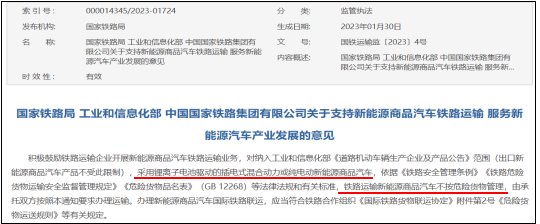
Figure6 National Railway Transport Supervision [2023] No. 4 Document Issuing Interface
The "Opinions" clearly to support the development of the new energy vehicle industry, lithium battery-powered vehicles (including pure electric and hybrid) that meet the following requirements can be transported by general cargo during domestic railway transportation.
- Vehicles: vehicles included in the scope of the Announcement of Road Motor Vehicle Manufacturers and Products issued by the Ministry of Industry and Information Technology, andSOC shall not exceed 65%, the oil tank hole cover shall be closed without leakage or leakage, and oil shall not be filled or extracted during railway transportation. Friendly reminder: The export of new energy commodity vehicles is not within the scope of application of the Opinions.
2, the shipper: should provide the car product factory certificate, product and certificate must be consistent. The shipper shall be responsible for the authenticity of the factory certificate and the quality and safety of the vehicle. Friendly reminder: when the shipper consignment, in addition to the assembled battery, shall not carry spare batteries and other batteries. In addition to the factory equipped with essential items, the car interior and trunk shall not be loaded with other items and entrainment.
3, the carrier: carefully check the factory certificate, no factory certificate of the vehicle shall not be carried. Load and reinforce the vehicles transported as required. (See Technical Requirements for Reinforcement of Railway Cargo Loading (TB/T 30004) for reinforcement requirements).
4. Emergency management requirements: shippers, carriers and other transportation units shall be equipped with emergency rescue equipment and equipment in accordance with the "Guidelines for Emergency Rescue of Electric Vehicle Disasters and Accidents" (GB/T 38283), and corresponding emergency measures shall be taken in time after the accident.
3. Other Battery Products
At present, the "Railway Dangerous Goods List" (TB/T 30006-2022) has not included UN3536 (containerized lithium battery energy storage system) and sodium ion batteries (UN3551 and UN3552). Domestic rail transport of such products may require consultation with specific rail transport authorities.
---- Quited from "Compliance Chemistry"






